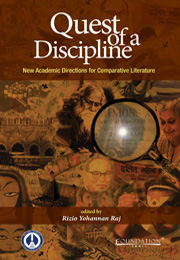Book contents
- Frontmatter
- Contents
- List of Contributors
- Acknowledgements
- Prologue to the “Quest'
- Introduction
- PART I Traditions and Manifestoes: Reflecting on Perspectives
- PART II The Quest Motif: Redefining the Scope of Comparative Literature
- 4 Beyond ‘Other Words’: The ‘Relevance’ of Translatology as Comparative Literature
- 5 Intertextual Lores and the Play of Language: Folklore/Orality in the Comparative Context of Literature
- 6 Towards a Comparative Performance Studies
- 7 Media Studies and the Academic Elite
- 8 Comparative Film Studies: The Culture Studies Turn in Comparative Literature
- 9 Finding Space in the Margin: Teaching Women's Literature in a Comparative Perspective
- PART III The Dynamics of Exchange: Genres, Areas and Disciplines
- PART IV India: A Curious Comparative Space
- Afterword: Comparative? Literature?
- Index
9 - Finding Space in the Margin: Teaching Women's Literature in a Comparative Perspective
from PART II - The Quest Motif: Redefining the Scope of Comparative Literature
Published online by Cambridge University Press: 05 June 2012
- Frontmatter
- Contents
- List of Contributors
- Acknowledgements
- Prologue to the “Quest'
- Introduction
- PART I Traditions and Manifestoes: Reflecting on Perspectives
- PART II The Quest Motif: Redefining the Scope of Comparative Literature
- 4 Beyond ‘Other Words’: The ‘Relevance’ of Translatology as Comparative Literature
- 5 Intertextual Lores and the Play of Language: Folklore/Orality in the Comparative Context of Literature
- 6 Towards a Comparative Performance Studies
- 7 Media Studies and the Academic Elite
- 8 Comparative Film Studies: The Culture Studies Turn in Comparative Literature
- 9 Finding Space in the Margin: Teaching Women's Literature in a Comparative Perspective
- PART III The Dynamics of Exchange: Genres, Areas and Disciplines
- PART IV India: A Curious Comparative Space
- Afterword: Comparative? Literature?
- Index
Summary
INTRODUCTION
…the space in the margin is a site of creativity and power, that inclusive space where we recover ourselves, where we move in solidarity to erase the category colonizer/colonized. Marginality as a site of resistance. Enter that space. We greet you as liberators.
- bell hooks, ‘Marginality as a Site of Resistance’As early as 1906, Tagore used the term Viswa Sahitya (world literature) to refer to an approach to literature that cuts across boundaries – national, political and linguistic. René Wellek argued in 1956 that a truly comparative literary history would describe transnational genres, schools or periods, placing texts inside a scheme of universal literature (Wellek and Warren 245). There had been no doubt among early scholars that Comparative Literature should include the possibility of studying all literatures with linguistic vigour. Perhaps, the most significant question that Comparative Literature has raised till today is the ideal of ‘open borders’ in a ‘global republic of letters’. Nevertheless, renewed nationalism has led to a sustained reconsideration of the geographic and linguistic identities that have often regulated Comparative Literature.
Comparison: What with What?
Ulrich Weisstein, in The Year Book of Comparative and General Literature, asks the question, ‘What is to be compared with what, by whom, to what end and under what conditions?’ This question acquires more importance in the context of external as well as internal differences of cultures. One cannot, however, obscure the complex interweaving of cultural processes.
Information
- Type
- Chapter
- Information
- Quest of a DisciplineNew Academic Directions for Comparative Literature, pp. 143 - 154Publisher: Foundation BooksPrint publication year: 2012
